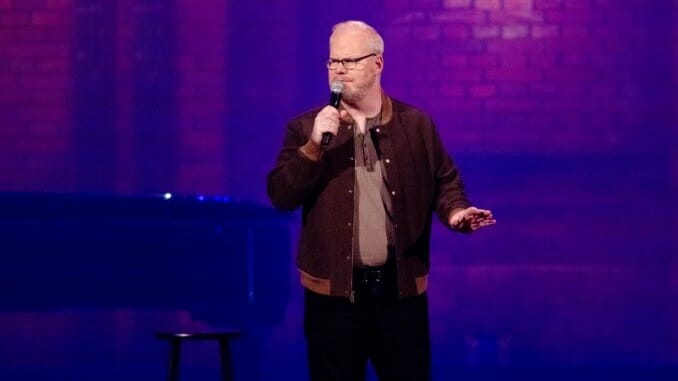For the past couple of decades, comedian Jim Gaffigan has effortlessly helmed the “good, clean fun” subgenre of stand-up comedy. While his contemporaries routinely took clear political stances on the stage, Gaffigan settled for telling the world about how lazy he was. While others excitedly toed the line of controversy, Gaffigan ambled on about his affinity for hot pockets. Gaffigan has always been happy to remain comfortably inside the family-friendly lanes, allowing his peers to take on the uglier stuff.
Until now, that is. Gaffigan’s new stand-up special, Comedy Monster, brings him back to Netflix but takes him out of his comfort zone in a number of ways. Not only has he upgraded from the cozy comedy club venue to a gigantic stage in Minneapolis, but he also gears a great deal of his jokes toward the current political climate—with some nice food-based gabs sprinkled in, of course, as well as a winding bit about the ramifications of the pandemic on none other than marching bands.
The secret behind Gaffigan’s gear-shift toward more politically-grounded jokes really isn’t a secret at all. The spiky, proton-shaped elephant in the room has not only taken over the world, but a vast majority of media, too—whether we like it or not. And, in hindsight, stand-up comedy was likely the medium most susceptible to this, as it consists, more-or-less, of someone getting up on a stage and talking about the things that are going on in the world.
But there’s something admittedly different about watching Gaffigan shift focus in this way. In 2016, it became clear that the funny family guy had a bit of an edge to him, when he used his Twitter to unjokingly oppose Donald Trump. And now, that serious, critical edge has permeated the once-clear boundaries of his dad-joke style.
This isn’t to say that Gaffigan’s comedic style has changed at all—quite the contrary; and this does admittedly come with its own kind of monotony. Near the beginning of Comedy Monster, he lists the things that COVID has taken away from us: Birthdays, weddings, baby showers. But, he adds, there have been some bad parts, too. This is a classic Gaffigan goof, with a setup, punchline, and the overarching air of a goofy-yet-dejected dad.
Gaffigan’s comfort in sticking to his light-hearted, inoffensive joke-style when discussing matters like the pandemic is exactly what makes Comedy Monster so effective—and so eerie. Indeed, a virus that has been ravaging the global population for almost two years now has become so embedded in our common zeitgeist that it perhaps isn’t even the case that Gaffigan is departing from his own comedic style to address it, but that we have become so accustomed and desensitized to our dire state of current affairs, that it has, in turn, become appropriate for Gaffigan’s inoffensive niche.
But Gaffigan doesn’t just lean into the obviously tragic and catastrophic elements of COVID. He also talks about how it disrupts the monotonous minutiae of our everyday—using the same tone and inflection he would use to wax poetic on how much he loves burgers. And this brings us back to Gaffigan’s marching-band bit, which is perhaps the most successful part of Comedy Monster. One of the many things that COVID has taken a toll on, Gaffigan says, is parades. What, then, does this mean for marching bands? He then dives into the complex history of marching bands, and eventually relates it back to his own comedy style.
This isn’t to say, though, that Comedy Monster is primarily about the pandemic, or about the other political issues that he surprisingly touches on—including stolen land and the irresponsibility of billionaires, to name a couple. For the most part, this special is just the same-old Gaffigan, taking every opportunity he can to make self-deprecating jokes, taking little, lighthearted jabs at himself for being a devout Catholic, lamenting about bicyclists, being a dad, and so-called “pretty-privilege.” In the end, though, the semi-frequent eye-rolls at Gaffigan’s predictable jokes will more than likely find pay-off in the realization that he is a comedian who really understands what it’s like out there in the world.
Aurora Amidon is a film journalist and passionate defender of Hostel: Part II. Follow her on Twitter for her latest questionable culture takes.
